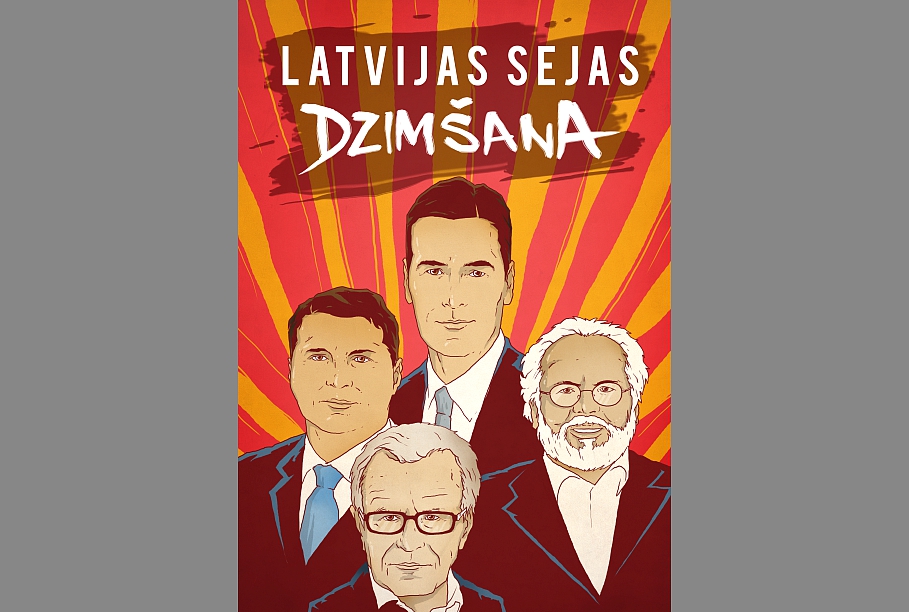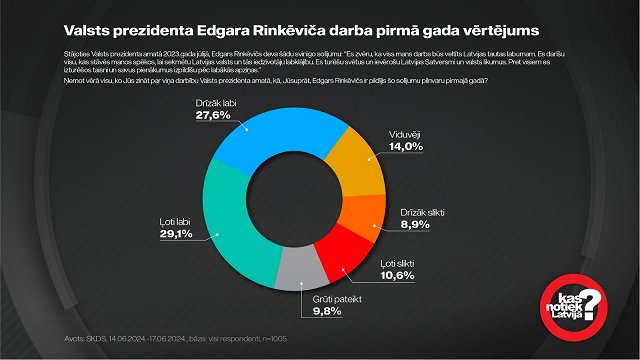The reason is simple: the winner requires at least 51 votes from the 100 lawmakers representing 6 different parties, but with the ballot taking place in secret, lawmakers have a habit of saying they will vote one way, then doing something else to settle personal scores, confident in the knowledge that no-one will ever find out.
The odds are further reduced by the fact that one MP, Dainis Liepins of the Regional Alliance party is currently suspended from the parliamentary chamber pending an investigation of his financial affairs, so only 99 deputies will have their fingers on the trigger this time round.
In any case Latvian presidential elections tend to throw up surprise results as was the case four years ago when the virtually unknown Andris Berzins won the day against Valdis Zatlers who was trying for a second term with sky-high ratings after dissolving parliament some months earlier.
Zatlers' popularity with the public counted for nothing - indeed quite the opposite as many lawmakers took the opportunity to get back at him for daring to challenge their fitness to govern.
Berzins is not standing for re-election.
“What goes on in the parliament on election day is very much a 'black box'. We don't know how people will vote, which parties will be supporting whom,” says Ivars Ijabs a political scientist at the University of Latvia.
“We have some idea, but there is no clear perception. Right now, in Latvia no-one knows who's going to be the next president. It means we follow it like a football game.”
While Latvia is a parliamentary rather than presidential republic, the president's role is more important than it seems, in Ijabs' view.
“The President has more weight than is written in the constitution because he or she is seen as a source of stability who fulfils some of the roles that in other countries are fulfilled by a second chamber. The President also selects the candidates for Prime Minister. In a country where coalitions change quite frequently this can be crucial,” says Ijabs.
The four candidates this time around are Defence Minister Raimonds Vejonis of the Greens and Farmers Alliance party; Egils Levits, a judge at the European Court of Justice nominated by the right-wing National Alliance; former basketball star and banker Martins Bondars of the small Regional Alliance party, and veteran parliamentarian Sergejs Dolgopolovs of the Harmony party which receives most of its backing from Latvia's Russian minority.
Of the four, Vejonis and Levits are regarded as the front runners, but in the fractious world of Latvian politics, no candidate can be entirely sure of picking up unanimous support from his own party, let alone picking up votes from other parties.
Levits said on a recent LTV debate: “My priorities are reform of the legal system, security and social questions,” adding that he hoped to pick up support from several parties in parliament.
Speaking at a meeting of Baltic defence ministers in Lithuania, Vejonis said his experience stood him in good stead: “The President is also the commander of the armed forces so it's quite easy for a minister of defense to transform to be president because the priority of the president is also security... it will be important for the president to continue the development of the armed forces.”
Though regarded as an outsider, Bondars told LSM he is standing “Because I want to live in Latvia. My future, my family's future is here. It's important Latvia has its most capable people managing it at this important, geopolitically challenging time,” and said he drew for inspiration from his time as chief of staff for former president Vaira Vike Freiberga.
Speaking to the Ir news weekly, Dolgopolovs admitted becoming president was not his “life's dream” and that if elected he would be most active in the social sphere, reconciling tensions between Latvian and Russian communities.
His performance in the TV debate drew flak from many quarters for his failure to condemn outright Russia's actions in Ukraine. Levits was the clear winner of a viewer poll during the LTV debate.
The four candidates will enter the first vote together, with the one attracting fewest votes dropping out. The process is then repeated with three, then just two candidates.
However, a result is far from guaranteed with MPs able to register an abstention or simply not bother voting. If no candidate wins on June 3, nominations will be taken again and the whole process will start again around ten days later with new nominees.
The uncertain nature of the whole business has prompted calls for the electoral system to be revised.
One initiative has seen members of the public able to register and vote for their preferred candidates online at website mansprezidents.lv run by a pro-democracy NGO.
By June 1, more than 14,000 people have taken the chance to do so, with Bondars emerging as the leader ahead of Levits with popular former President Vaira Vike-Freiberga (not a candidate) in third.
Madara Peipina, organizer of the initiative told LSM the aim was to make lawmakers take public opinion into account when they vote.
“The presidential elections are quite opaque. There are suspicions about manipulation and back-room deals so we thought with this project we could force deputies to be more transparent and talk with society.
"On election morning we will take all the votes we have, take them to parliament and present them to the members saying 'This is society's opinion'. All our signatures are real people, you can check them all – this is not just some media poll,” Peipina said.





























